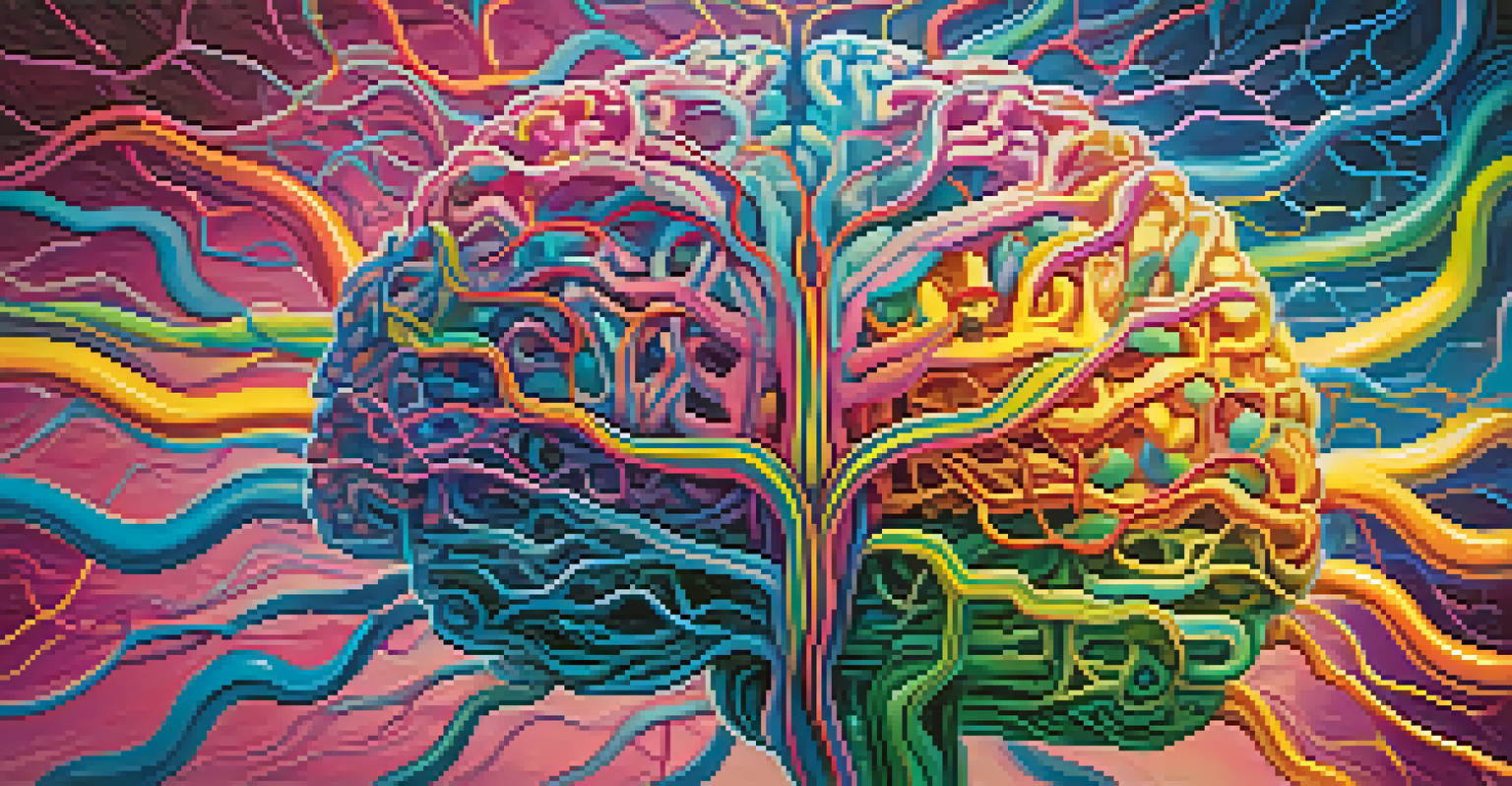Exploring Emotional Healing Through Hallucinogenic Experiences

Understanding Hallucinogenic Experiences and Their Effects
Hallucinogenic experiences refer to altered states of consciousness induced by substances like psilocybin or LSD. These experiences can lead to profound shifts in perception, allowing individuals to explore their thoughts and emotions in a unique way. Many users report a sense of connection to the universe or a deeper understanding of themselves during these journeys.
The experience of a hallucinogenic journey can be transformative, helping individuals confront their deepest fears and uncover profound insights about themselves.
The effects of hallucinogens on the brain are complex, often resulting in enhanced emotional processing. For some, this can mean revisiting past traumas or uncovering buried feelings that need attention. By bypassing some of the mental barriers we typically erect, these substances can facilitate breakthroughs in emotional healing.
While the experience can be deeply personal, common themes often emerge. Users frequently describe feelings of love, acceptance, and clarity, which can be incredibly therapeutic. This is why the exploration of hallucinogens in the realm of mental health is gaining traction.
The Science Behind Emotional Healing with Hallucinogens
Research has shown that hallucinogens can promote neuroplasticity, which is the brain's ability to reorganize itself by forming new neural connections. This process can lead to lasting changes in perception and behavior, making it a promising avenue for emotional healing. Studies indicate that these substances can help alleviate symptoms of anxiety, depression, and PTSD.

One key aspect of this healing is the emotional release that often accompanies hallucinogenic experiences. Users may confront fears or unresolved issues, leading to cathartic moments that can alleviate emotional burdens. It's akin to cleaning out a cluttered attic; once the mess is cleared, there’s space for new, healthier thoughts and feelings.
Hallucinogens and Emotional Healing
Hallucinogenic experiences can lead to significant emotional breakthroughs, helping individuals confront and process deep-seated issues.
Moreover, these experiences can foster a sense of community and shared understanding among users. Many individuals report feeling less isolated after their journeys, as they realize that others share similar struggles. This connection can be a powerful catalyst for healing.
Personal Stories of Transformation Through Hallucinogens
Personal narratives play a crucial role in understanding the impact of hallucinogens on emotional healing. Many individuals have shared transformative stories about how their experiences helped them confront deep-seated issues. For instance, a participant might recount how a psilocybin journey allowed them to process grief in a way they hadn't been able to before.
Psychedelics can help us to see ourselves as we really are, to confront our fears, and ultimately, to heal.
These stories often highlight the profound sense of clarity and resolution that can come from a single hallucinogenic experience. People frequently describe feelings of liberation and renewed purpose afterward, which can significantly improve their overall mental health. It’s like emerging from a storm into a clear sky, filled with possibilities.
However, it's essential to approach these narratives with caution, as experiences can vary widely. While some find healing, others may have challenging encounters. This underscores the importance of setting, preparation, and support when undertaking such journeys.
Setting and Environment: Key Factors for Healing
The setting in which one consumes hallucinogens can significantly affect the experience. A safe and comfortable environment helps foster positive emotional outcomes. This is why guided sessions, often referred to as 'therapeutic settings,' are becoming popular, as they provide both safety and structure.
In these controlled environments, trained facilitators can help guide individuals through their emotional journeys. They can offer support during difficult moments, ensuring that participants feel secure as they navigate their feelings. Think of it as having a trusted friend by your side during a challenging hike; the journey feels less daunting.
Importance of Setting for Healing
The environment in which hallucinogens are consumed plays a crucial role in shaping the emotional outcomes of the experience.
Moreover, the atmosphere can enhance feelings of acceptance and connection. Whether it’s soothing music, calming visuals, or the presence of nature, these elements can help create a more profound emotional experience. This highlights how intentionality and mindfulness can shape the healing process.
Integration: Making Sense of the Experience
Integration refers to the process of making sense of one's hallucinogenic experience after it occurs. This step is crucial for translating insights gained during the journey into everyday life. Without proper integration, the potential benefits can fade away, leaving individuals feeling disoriented or confused.
Many people find value in discussing their experiences with therapists or in support groups. These discussions can help them articulate their insights and apply them to their emotional healing journeys. It’s similar to piecing together a puzzle; the more you talk about it, the clearer the picture becomes.
Journaling and creative expression can also be powerful tools for integration. By capturing thoughts and feelings on paper, individuals can reflect on their experiences and track their emotional growth over time. This ongoing process can lead to deeper self-awareness and lasting change.
The Role of Professional Guidance in Hallucinogenic Healing
While personal experiences with hallucinogens can be powerful, professional guidance can enhance the healing process significantly. Trained therapists can provide the necessary support and structure needed for a safe exploration of emotions. This professional backing can make a world of difference in how individuals navigate their journeys.
Moreover, therapists can help tailor the experience to the individual's specific emotional needs. By understanding clients' backgrounds and challenges, professionals can create a more personalized approach. This ensures that the experience is not only safe but also deeply relevant to the individual's healing journey.
Integration Enhances Experience
Proper integration of insights gained from hallucinogenic experiences is essential for translating those experiences into everyday life.
As interest in the therapeutic potential of hallucinogens grows, more professionals are emerging in this field. This trend points to a future where emotional healing through these substances could become more mainstream, provided it's approached with care and respect.
Conclusion: Embracing the Journey of Emotional Healing
Exploring emotional healing through hallucinogenic experiences is a promising frontier in mental health. While not a panacea, these substances can offer valuable insights and emotional breakthroughs for many individuals. The key lies in understanding the nuances of each journey and ensuring that the experience is approached with intention and care.
As we continue to unravel the complexities of the human mind, hallucinogens may play an essential role in shaping our understanding of emotional health. Just as important is the conversation around safety, support, and integration, which can amplify the healing potential.

In embracing these journeys, we open ourselves to new possibilities for emotional well-being. With the right mindset and guidance, hallucinogenic experiences can illuminate paths to healing that many are yet to discover.